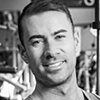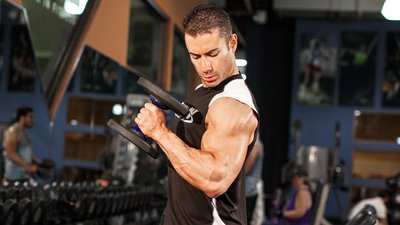Many of us spend years and years trying to get rid of extra body fat with little or no success. We yo-yo and ride the diet rollercoaster, with too much "roll" along the way. We attack our fat when motivation is high, but we still crumble at the sight of warm cookies. Unfortunately, this stilted progress results in many unfinished New Year's resolutions and dissatisfied gym clients. Fat loss might be the most common fitness goal, but it's definitely no easy task to achieve.
If you've been playing the fat-burning fight for a long time and have yet to win a round, it's probably because you're making one or more of the mistakes below. I'll help you avoid these common fat-loss slip-ups so you can get back in the game!
Mistake 1. You Eat Too Much
I know this seems like an obvious mistake, but many people truly don't know how many calories they're actually eating. For example, ordering a salad might seem like a healthy choice, but you could be getting a 600-calorie meal without even realizing it. Sauces, dressing, ketchup, and oils all have calories you probably don't even think about. Especially if you don't regularly cook at home, you're probably eating more calories than you think.
We're told over and over that the simple weight-loss process is to eat fewer calories than you expend throughout the day. However, this "calories in, calories out" methodology oversimplifies matters. Hypothetically, this system would work if you ate 1,500 calories worth of cheesecake per day and burned 2,000, but the human body isn't a calculator. The type of calories you eat matters. A carbohydrate-only diet will not help you reach your fat-loss goals. You need the right combination of protein, carbohydrates, and healthy fats to build muscle and burn fat.
For most people, a 40/40/20 ratio works great. If 40 percent of your food comes from carbs, 40 percent from protein, and 20 percent from fat, the stage is set for positive change. However, that ratio is not the golden rule for all body types and goals. Do research and find what works best for you.
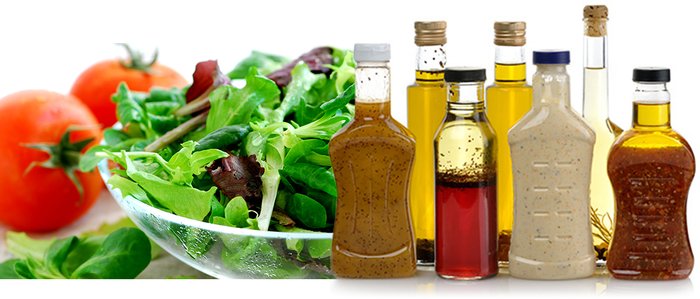
Ordering a salad might seem like a healthy choice, but sauces, dressing, ketchup, and oils all have calories you might forget.
Many people have to drop their carbs even lower to burn fat successfully. If you do, make sure you boost your fat intake at least slightly to give your body an alternative energy source.
Mistake 2. You Don't Eat Enough Protein
Protein does more than just build and repair muscle tissue. A 2003 study published in "Journal of Nutrition" found that, even though two groups of overweight women consumed an identical number of calories, the group whose members consumed a diet including 128 grams of protein per day lost more weight than members of the group consuming 68 grams of protein.[1]
Protein increases satiety at meals, which can help you help you feel less hungry and therefore eat less throughout the day. High-protein diets can also have positive results on the body's blood lipids, glucose levels, and muscle-to-fat ratios.
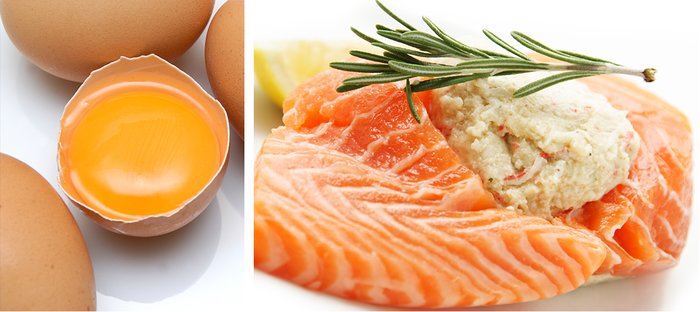
Protein increases satiety at meals, which can help you feel less hungry and therefore eat less throughout the day.
Protein is a great fat-loss macro, but don't think that you'll see quick results simply by adding some shakes to your diet. Fat-loss takes consistent dedication to the right nutrition plan for your goals. Choose high-protein foods at every major meal—especially instead of carb-laden options—and you'll see results over time.
Mistake 3. You Drink Too Much
The only liquid your body really needs is water. Sure you can have coffee, tea, and sometimes milk, but a steady stream of sugary beverages will undermine fat-loss. That pumpkin spice latte you love so much can easily have more than 300 calories! If you're drinking an additional 300 calories every morning, you're doing your body a disservice. Losing fat can be difficult enough, so don't make it any harder.
Booze can also make you lose the fat-loss war. A beer every once in a while won't hurt you, but it's imperative that you stop indulging in weekend binges. Alcoholic beverages are usually high in calories that your body just stores as fat, but just as crucially, it also impairs your judgment. So instead of making healthy food choices, your booze-brain will tell you that a big plate of nachos is the right choice.
Mistake 4. You Think Healthy Food Is Calorie-Free
It doesn't matter how healthy any particular food is; if you eat too much of it, you'll have a hard time losing fat. Of course it's important to eat whole foods, but overeating non-GMO, fair-trade, organic peanut butter is still overeating.
Two prime examples of healthy foods that run huge calorie tabs are nuts and seeds. The omegas, micronutrients, and phytogens in these "superfoods" are wonderful for your health, but the calories they carry can be excessive. This doesn't mean you should avoid them, but rather, when you pick up some almonds to snack on, don't eat multiple handfuls.
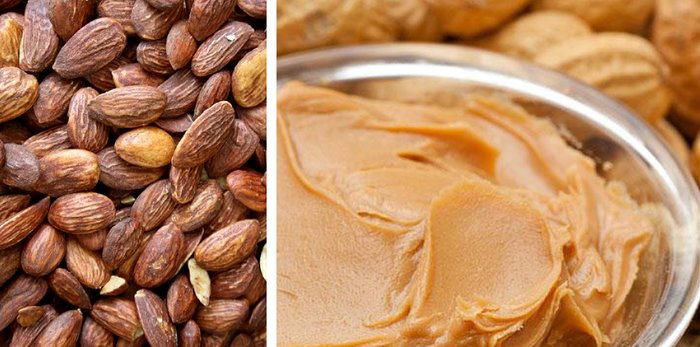
Of course it's important to eat whole foods, but overeating non-GMO, fair-trade, organic peanut butter is still overeating.
One ounce is difficult to measure, so limit yourself to about 10 almonds. Although the fat in almonds is good, it's better to fill up on micronutrient-dense foods, like green vegetables, that don't pack a lot of calories.
Mistake 5. You Don't Train Intensely Enough
Beginners should start slowly. However, as you grow accustomed to the weights, machines, and the gym atmosphere, you have to push harder and harder. You can't get comfortable, or you will plateau.
I can't tell you how many times I've seen women curl 5-pound dumbbells without breaking a sweat the entire workout. When I ask them why they don't lift heavier, they usually answer, "I don't want to get bulky." Man or woman, you have to lift hard and heavy, and the reason has nothing to do with getting huge!
If fat-loss is your goal, you have to create an extreme energy demand so your body can change. Lifting the same light weights day after day will not help you do this or meet any of your other physique goals.
Mistake 6. You're Doing Too Much Low-Intensity Cardio
I know, you're probably thinking to yourself, "Didn't he just tell me to train more intensely? Now he's telling me I'm doing too much of something strenuous! What's the big idea?" Well, cardio is not resistance training. It trains an entirely different aspect of the fitness spectrum. Don't expect a two-hour treadmill slog to produce the same results as an intense hour of heavy lifting.
If you want to perform cardio that will do you some good, make some of your workouts full-body workouts with short rest periods. By incorporating your whole body and shortening the rest periods, you'll challenge your cardiovascular system as well as your muscular system. That means more bang for your training buck.
Mistake 7. You're Stressed
Stress is the silent killer. When you get stressed, your body produces cortisol above and beyond the norm. Chronically elevated cortisol can be responsible for increased body fat storage and other negative consequences. Even if your diet and training are perfect, excessive stress can keep you from achieving those fat-loss goals.
Relax! Although that might be easier said than done, applying relaxation techniques to your day can have a big impact on your physique and overall health. Try yoga, take a bath, read a book, see a movie, or invest in 10-15 minutes of simple meditation.
Mistake 8. You Don't Sleep Enough
Like stress, sleep deprivation elevates cortisol, a fat-loss no-no. When you're short on sleep, your insulin sensitivity also decreases. Combined, these problems create a less-than-optimal fat-loss environment to say the least.
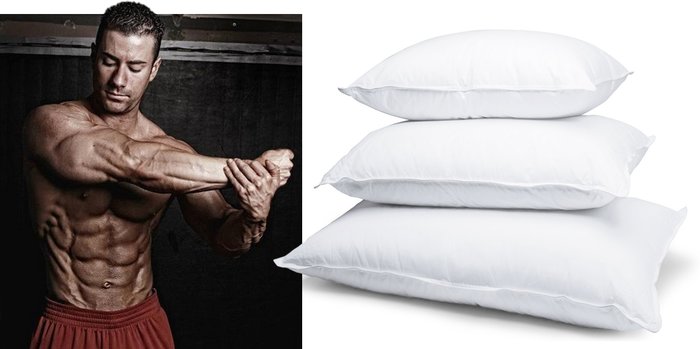
To reach your physique or fitness goals, prioritize sleep. You can't party all night, pass out for a couple hours, work the next day, and expect your body to respond positively. Shoot for at least 8 hours of sleep per night. Limit your use of electronics before bed, don't drink caffeine in the evenings, and give yourself some wind-down time to help you hit this target.
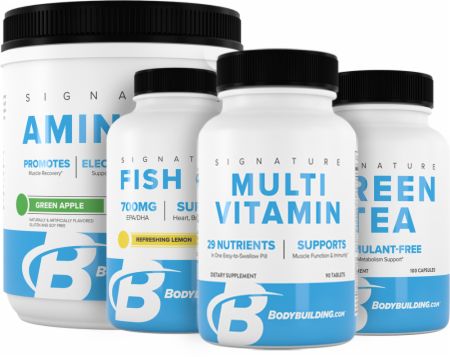
References
- Layman DK, Boileau RA, Erickson DJ, Painter JE, Shiue H, Sather C, Christou DD. A reduced ratio of dietary carbohydrate to protein improves body composition and blood lipid profiles during weight loss in adult women. J Nutr. 2003 Feb; 133(2): 411-7.


